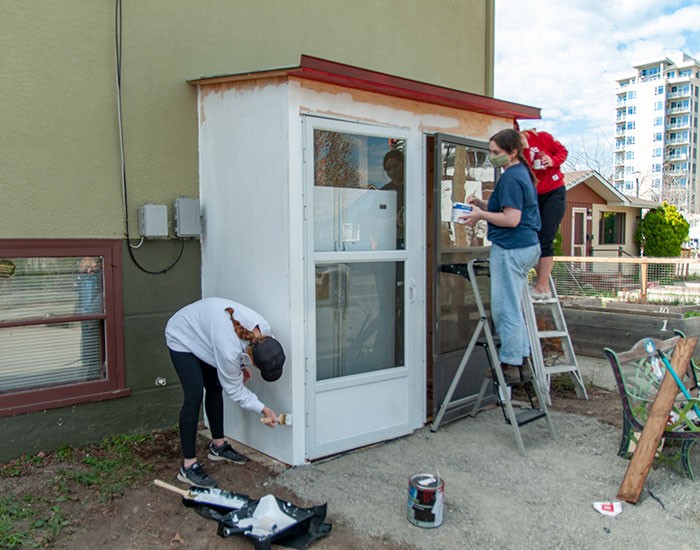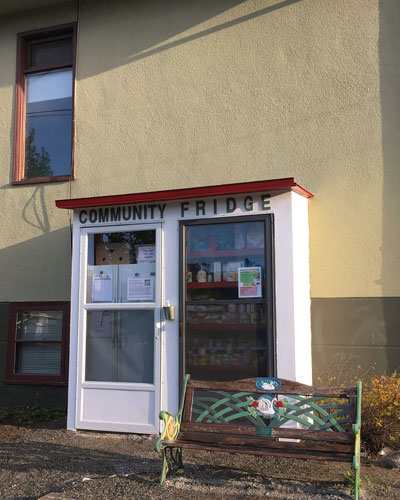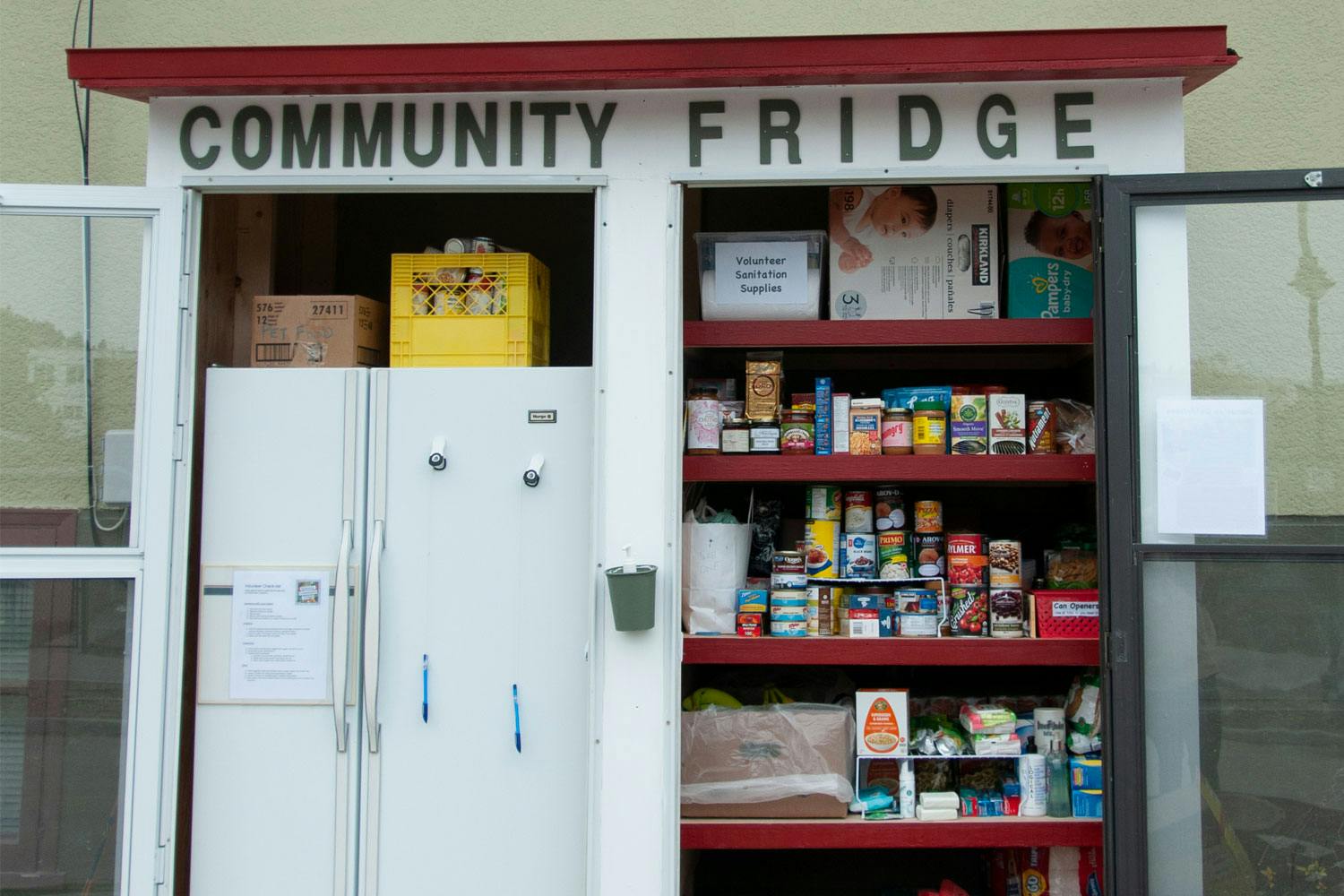Community Fridges Support Neighbours and Fight Food Waste
Volunteers are confronting food insecurity during the Covid-19 pandemic.
A new community fridge and pantry that recently opened in Kelowna, BC.
Food placed in any of Toronto’s community fridges seldom sits on the shelf for more than two hours. The fridges—there are at least seven—appeared on sidewalks in 2020 and are stocked full of food for the taking, no questions asked. Toronto’s community fridges are all in different neighbourhoods, and are located outdoors at street level, many right on the sidewalk.
The idea behind them is simple: walk up to a fridge any time of the day, take only what you need and leave the rest for others.
For many households, access to safe and nutritious food has been increasingly difficult since the onset of the Covid-19 pandemic last year. In fact, food insecurity in Canada spiked by 39%, according to Community Food Centres Canada, a non-profit improving low-income populations’ access to healthful food. Insecurity rates are highest among racialized and Indigenous communities.
“A lot of the people who fit the criteria of being insecure might not feel comfortable accessing charity resources because of red tape or stigma,” says Jalil Bokhari, who co-founded Community Fridges Toronto (CFTO) in 2020 with chef Julian Bentivegna. “We don’t have criteria for who can use it, and how often they can use it, because it’s anonymous. Food is a right, and no one person is more deserving of food than anyone else.”
Bokhari and Bentivegna know each other through their work in Toronto’s restaurant industry (Bohkari works as a bartender). The idea to establish the first community fridge outside Bentivegna’s restaurant, Ten, was partly born of the chef’s desire to reduce the amount of food waste produced by his kitchen. (Perfectly good food, to be clear: one of the network’s main tenets is that people should only donate food they would eat themselves.)
Food donations need to be new, unopened, and fresh. The fridges accept produce, dairy, bread, and proteins, as well as pantry staples, grab-and-go food, pet food, and personal care items (including personal protective equipment and menstrual products). No expired food, home-cooked food, or leftovers are accepted.
Food is a right, and no one person is more deserving of food than anyone else.
Bokhari was inspired to open a community fridge after a friend of his in New York City had success opening one outside of her Brooklyn café, Playground Coffee Shop. The first fridge was set up in July 2020 outside of Ten in Toronto’s Brockton Village neighbourhood. Bokhari and Bentivegna have since set up six more fridges, and amassed a volunteer network of hundreds, including local residents, business owners, and hospitality industry workers.
The community-fridge concept is not new — nor is it unique to Toronto. The first well-known community fridges were set up in 2012, in Germany. Since then, fridges have been set up around the world, from the Netherlands to New Zealand. But their proliferation accelerated in 2020, as the financial insecurity wrought by Covid-19 increased food insecurity. Since the launch of CFTO, similar initiatives have popped up in Calgary, Vancouver, Montreal, New York City, and Seattle, among other cities.

Volunteers paint the structure housing Kelowna’s community fridge and pantry.
CFTO, like the other fridge projects, is a mutual aid program. Mutual aid organizations, which have flourished during Covid, are organizations that depend on the voluntary exchange of time and resources, meant to build solidarity among participants through a framework of community and cooperation.
Project volunteers split the work of stocking and cleaning fridges, or facilitating the delivery of large donations from local restaurants or other organizations, while community members fill in the gaps by making small, individual donations. According to Bokhari, there’s no set schedule for cleaning or donations, but he and Bentivegna help ensure things are running smoothly by monitoring communications in a group Signal chat, and sending call-outs and updates via Instagram.
While volunteers are frequent donors, Bentivegna says upwards of 80% of the fridges’ stock comes from other members of the community, including local restaurants and food banks.
The idea that you need money to help people encourages a kind of backseat mentality.
Some local organizations — such as volunteer group Bike Brigade, which coordinates medium-scale food deliveries to the network of fridges — have signed up as unofficial partners. But since CFTO is completely decentralized and volunteer-run, there is no drop-off centre or headquarters. Instead, all items are placed directly into the fridges by donors, and everything involved, from food to fridges, has been donated.
“We push away from the idea that you need money to help people, because it encourages a kind of backseat mentality; this idea that if you throw money at something, it will work itself out,” Bokhari says. “We’re empowering people to pitch in… Sometimes means they’ll buy food. But sometimes it means they’ll clean a fridge.”
Each fridge is located outside a private business that has donated space. Sierra Leedham is a volunteer whose clothing store, Black Diamond Vintage, previously hosted a fridge in front of its main doors. (It was removed due to a City of Toronto bylaw that does not allow “abandoned” appliances on public property; the fridge has since been moved into an accessible private space.) The Parkdale shop owner says she regularly fills, cleans, and delivers large donations to fridges around the city, a commitment that she says is typical of CFTO’s dedicated team of volunteers.

The completed and stocked structure is ready for community members to help themselves, or take a rest on the neighbouring bench.
She says the largest challenge facing the network is quality control: “trying to communicate to people that, if you wouldn’t want to eat it yourself, don’t put it in the fridge.”
“It’s about solidarity and care and respect and love for the community,” adds Leedham, “and not just thinking that people should be thankful for what they get.”
Paul Taylor, executive director of food justice non-profit FoodShare in Toronto, is supportive of mutual aid efforts such as community fridges. But he worries that politicians will use the enthusiasm for mutual aid as a reason to take the implementation of anti-poverty and food insecurity policy measures off the table.
“Communities and individuals are responding to a moral imperative to support folks in their neighbourhoods that don’t have enough food,” he says. “A lot of [community] interventions [understand] that it’s racialized folks and Indigenous folks that are most affected by food insecurity … whereas our government is not addressing the issue adequately.”
Taylor worries politicians will use enthusiasm for mutual aid as a reason to take anti-poverty and food insecurity measures off the table.
When he looks at organizations like CFTO, Taylor is heartened that today’s community-based interventions “not only recognize race-based inequities, but they also recognize systemic and structural inequities.” He adds that it gives him hope because this action could address structural issues leading to food insecurity in these communities.
In the meantime, CFTO plans to continue to fine-tune its programming. Bohkari and Bentivegna both say their main focus is on ensuring their existing fridges are serving their communities as best they can, rather than on expansion.
“Since we’re not an actual organization, we can’t just will things into existence,” Bokhari says. “Expansion has to be something that the communities themselves are willing to come together and support.”
Print Issue: Spring/Summer 2021
Print Title: Street Food
